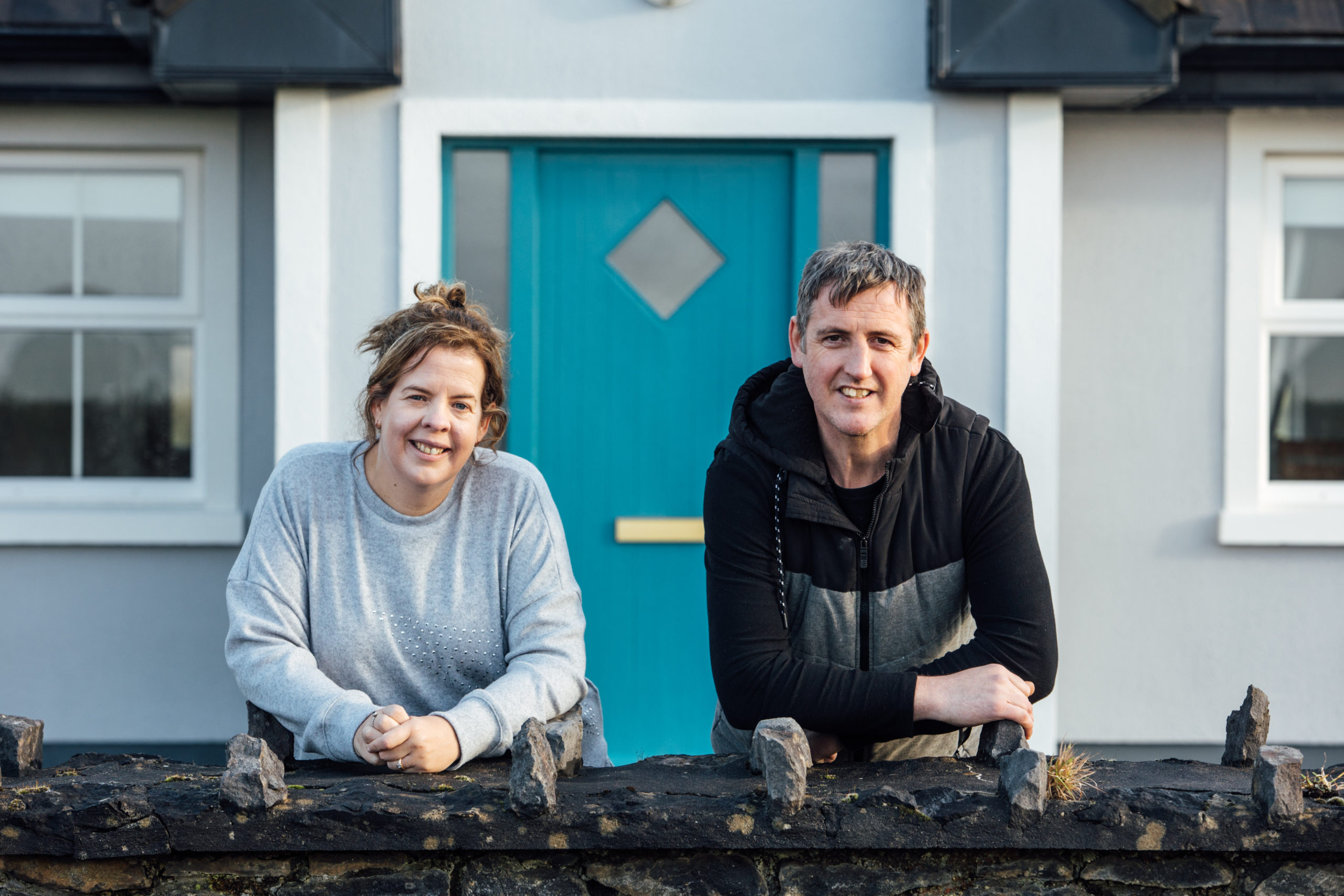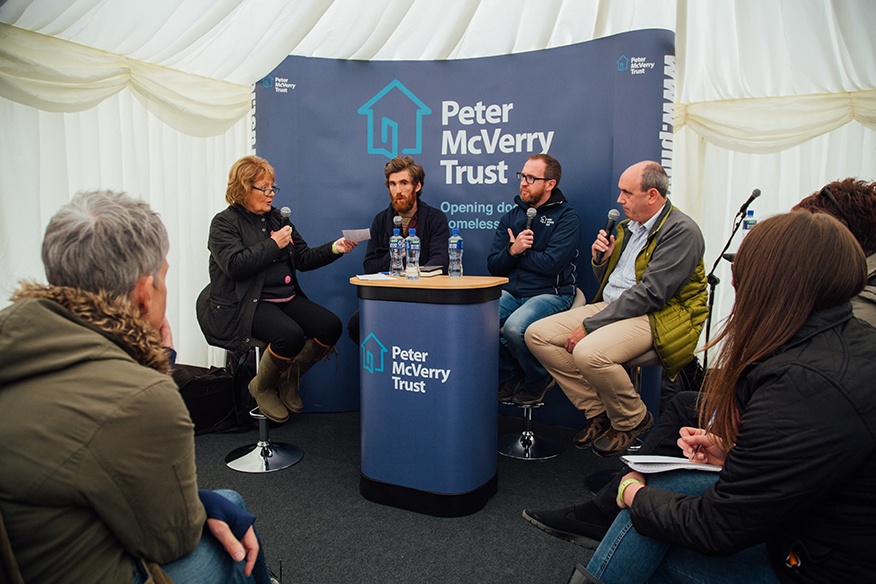19th September 2018
Peter McVerry Trust, the national housing and homeless charity, has proposed new measures to help tackle rural homelessness. The measures which range from piloting a rural Housing First programme and new multi-disciplinary homeless day services comes as the latest official figures show that over 1,200 people are now homeless across rural Ireland.
The charity outlined their proposals at the National Ploughing Championships in Screggan, Co. Offaly where it also announced it would be providing housing or homeless services in 13 counties across Ireland by the end of 2018.
Pat Doyle CEO of Peter McVerry Trust said “The proposals that we have published today are all about responding to the needs of people affected by homelessness in a solution focused manner. Peter McVerry Trust will always seek to do whatever it can to respond to the needs of people at risk of, or impacted by, homelessness. Over the past few years we have been engaging with an increasing number of local authorities outside of Dublin, which is a reflection of the growing need as well as our efforts to support vulnerable people. This expansion has seen us provide greater number of services and an increased number of housing units in more rural counties and has also deepen our understanding of the issues people are facing across Ireland.”
“Peter McVerry Trust has also been closely monitoring levels of rural homelessness for the past number of years. We are on record as suggesting a more targeted approach to the issue of rural homelessness could end homelessness in most parts of the country. Unfortunately, the opportunity to make a real dent in rural homelessness is now in danger of being missed as official homeless statistics for July 2018 figures show that there are now over 1,200 people homeless in rural Ireland. That is up by about 30% in 2018.
“The eight proposals put forward today are about building a strategic, innovative response to rural homelessness and to ensure that we follow international best practice when it comes to tackling the issue. While in some respects the answer to both rural and urban homelessness is housing, there is much greater difficulty in delivering wraparound supports and also providing people with access to local or regionally based services such as addiction treatment or mental health services.”
“Among the key proposals that we have laid out are the adaptation of the Housing First model to rural Ireland, the piloting of a on new integrated multi-disciplinary homeless support service, better provision of housing for single people in rural towns and villages, as well as measures to deal with long term empty homes and mortgage arrears. We hope that these proposals will be taken on board and reflected in new policy and budgetary decisions that will be taken by government in the coming weeks and months.”
Full details of the Solutions to Rural Homelessness
Establish a Multi-Agency Taskforce on Rural Homelessness
Peter McVerry Trust believes that a multi-agency task force on rural homelessness should be established immediately with a cross section of government departments, statutory agencies and voluntary organisations. The task force would be charged with delivering a high intensity and tailored response to the challenges of rural homelessness.
The multi-agency nature of the task force is critical in bringing together services in the areas of housing, finance, rural affairs, health, education, justice and children and youth affairs issues to be addressed in a structured fashion. As a first step the taskforce should commit to undertaking an extensive research and analysis of rural homelessness in Ireland and the potential impact of mortgage arrears on rural Ireland.
Strengthen Investment in Affordable and Social Housing in our Towns and Villages
If rural homelessness is to be addressed in a meaningful way, then more affordable and social housing must be built in towns and villages across rural Ireland. The discussion on housing and social housing is almost exclusively focused on our cities and not enough attention is paid to the needs of the 38,000 households in rural Ireland waiting on social housing.
New social housing must also be built to reflect the actual housing need that exists and adequate provision must be made for single-person households, including people exiting homelessness.
Establish an Empty Homes Network for Rural Ireland
Further to the Government’s National Vacant Housing Reuse Strategy Peter McVerry Trust believes there is an urgent need to put in place an Empty Homes Network. This network should consisting of local authority staff, approved housing bodies and other appropriate agencies and organisations that would establish sustainable ways to revitalise our towns and villages for community benefit.
The network would also work to counter increasing levels of vacancy arising in rural in towns in both commercial and residential buildings.
Introduce a new Housing First Programme for Rural Ireland
Peter McVerry Trust believes the introduction of a rural focussed Housing First programme is a key element of addressing rural homelessness. The Housing First model is an innovative and internationally recognised programme which has been proven to be the most successful way to support people in homelessness with complex needs such as people sleeping rough, and those with mental health and addiction needs. It has been very successful in Dublin, where it has been operational since 2014 (maybe add detail here on Housing First tenancy sustainment rates in Ireland and abroad)
A rural Housing First programme would be adapted to take into account the lower density of people impacted by homelessness. A rural Housing First programme would also involve the development of highly mobile multidisciplinary teams that would make use of integrated tele-health supports.
This initiative would have the added benefit of providing rough sleeper engagement teams across rural counties.
Roll out Homeless Housing Assistance Payment on a National basis
The Homeless Housing Assistance Payment (HAP) has been crucial in securing private rental accommodation for people exiting homelessness in Dublin. It offers a significant top-up on existing
HAP rates to ensure that people dependent on the scheme can secure private rental accommodation at market rents. Peter McVerry Trust believes the scheme must be expanded nationally to both increase and accelerate the number of individuals, couples and families exiting homelessness.
While HAP is not perfect it is clearly a better alternative to paying for huge numbers of people in emergency accommodation.
Build Stronger Local Health Services and improve access to Mental Health Services and Alcohol & Drug Treatment Services
In rural Ireland it can be incredibly challenging to secure access to the appropriate health services.
For people in need of mental health services or alcohol and drug treatment supports it is often the case that the appropriate supports are not available locally or sometimes even regionally.
For many people in homelessness mental health and/or alcohol and drug misuse are part of the reason they become homeless therefore ensuring better access to services can act as homelessness preventative measure. In recent studies of drug misuse in Ireland amongst young people it was found that alcohol was found to be the drug which was most prevalent and problematic for young people in rural area.
Ensuring access to services such as mental health supports as well as alcohol and drug treatment services can act as a preventative measure and also offer valuable supports to people in homelessness.
This would be a key challenge for the Multi-Agency Taskforce on Rural Homelessness proposed earlier in this document.
Protect Home Owners and Tenants Impacted by Long Term Mortgage Arrears
It is incumbent upon the State to protect people who may currently reside in a home that is likely to be subject to repossession proceedings. The State through the Department of Finance and the Department of Housing should conduct a cost benefit analysis of the possibility of the State directly acquiring tens of thousands of mortgages in long term in order to prevent people in these properties becoming homeless and/or requiring years of expensive housing subsidies once they lose their home.
Integrated Multi-disciplinary Homeless Support Service
A new Integrated Multi-Disciplinary Homeless Support Day Service in rural locations would encompass addiction, mental health, housing and homeless support services in a single site It would also offer a safe space for people in need to spend time, meet their key workers and also to access IT, food, laundry and storage services.
This service would cover a wide geographical rural area and assist people in need to secure and sustain housing. It would also act a natural base for a rural housing first programme or team.

